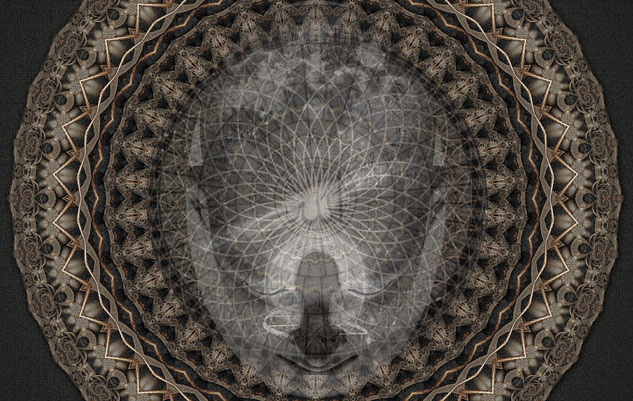Bismillah al-Rahman al-Rahim
Sculpt Yourself
Nurture Understanding
Added October 08, 2012 (Written April 2007)

Like flotsam in a flood we are too frequently carried along by the overpowering flow of ideological currents, modalities of thought, and expressions of our times. Those who play at politics with deadly earnest, act, and the rest of us only react. Without firm and deep knowledge and connection with higher principles, our environments will shape and mold the form of our minds. Socially, politically, ideologically - the parameters within which we function (even the parameters within which we view and understand our own religion) will be driven and informed by a societal nafs that derives its structure from ambitions, desires and impulses that originate from and focus upon the gain to be achieved in this lower world (dunya).
In such surroundings, even while we imagine ourselves independent, we are caught in the push and pull of societal/ political/ ideological environments - objects floating in the stream. We have some restricted motion this way and that, but nevertheless the rushing river carries us along. Substance arises from depth of knowledge and understanding - without that solidity and profundity of knowledge, our “...numbers may be vast, but (we) will be as insubstantial as the foam of the water on the surface of the flood....” (hadith)
When we live out our religion and our lives without deep reflection, without being anchored firmly in the depths, satisfied with surfaces, we become like that insubstantial foam - and there is little doubt that each of us has felt that insubstantiality in the face of the rushing pace of our times.
Our approach to religion often reflects this inclination. We quote verses to display the Qur’an’s relevance to what we do, to how we see the world, and in defence of the specific direction of our particular beliefs, our leanings, our ways and methods - and we quote to justify to ourselves and to justify ourselves to others. We take our own limited perspectives and through pecking at scattered verses, offer them as justification for totalizing our own hemmed in understandings. With this we soothe ourselves. In this manner we construct small idols out of the clay of our opinions and hold this out as that which others should believe. Our reading of verses is accompanied by the chattering of what is already in our minds, understanding diverted by what is already in our characters - our thoughts busy spinning interpretations while the recitation is not yet complete.
“And when the Qur’an is recited, then truly listen, and remain silent within, that mercy may come upon you.” (Qur'an 7:204)
Reflection is the domain of a mind at rest, it requires stillness and an outer fortification against worldly din, media, worries, anxieties, interruptions, distractions - a temporary quelling of the desire to pronounce our opinions - a silencing of our inner fountain of preset habits, thoughts, assumptions, suppositions, attitudes, inferences, conjectures, and interpretations. With a brief respite from the noise and unceasing demands of daily life and our own mental habits and compulsions, the possibility of turning inward, of reaching beyond the surface and contemplating the inner kernel of a matter grows.
What is reflection except a rotation of focus towards interior constellations, the apperception of patterns through patient contemplation - allowing the mind the quiet, calm, concentration of its powers, opening degrees of depth and considering each matter in its many inter-related aspects to recognize its relationship to surrounding events and see the subtle connections which join and envelop all things and which connect all to a deeper reality, but which escape our daily perception.
“Use the intellect that examines, that penetrates into matters…and not just the intellect that repeats what it hears, for surely there are many that repeat the knowledge that they hear, and there are precious few who examine it deeply.” (Ali ibn Abu Talib)
The shell of a seed protects its kernel so that it may have an opportunity to gestate and grow. So too thoughts need to gestate and grow over time. In this manner we can perhaps begin to create and shape an inner world of depth and texture arising from a struggle to acquire real understanding, to truly expand and deepen the boundaries of knowledge, to perceive not just form, but meaning - inner content.
We perhaps become the sculptor rather than being sculpted by external forces and inner compulsions and biases, the shaper rather than the shaped, creating and modifying our own internal configuration rather than allowing the world and its ever shifting attitudes and perspectives to impose a configuration on us.
Then there arises some possibility of acting in the din, strife, and apparent chaos of the external world with a measure of thoughtfulness and depth - with a considered consciousness devoid of haste and maladroitness. Unruffled, collected, we can perhaps bring inner resources (nurtured to capacity) to bear on the complexity of life and bring a level of steadiness to the self and thereby possible benefit to others. [1]
“There is no worthwhile movement (or action) whatsoever but that you need (to nurture) understanding for it.”(Ali ibn Abu Talib)
*
To be notified when new articles are added to this site, please follow @i_from_i (islam from inside). Or, if you prefer, subscribe to the islam from inside RSS feed.
Footnotes
-
1 – Related Articles
